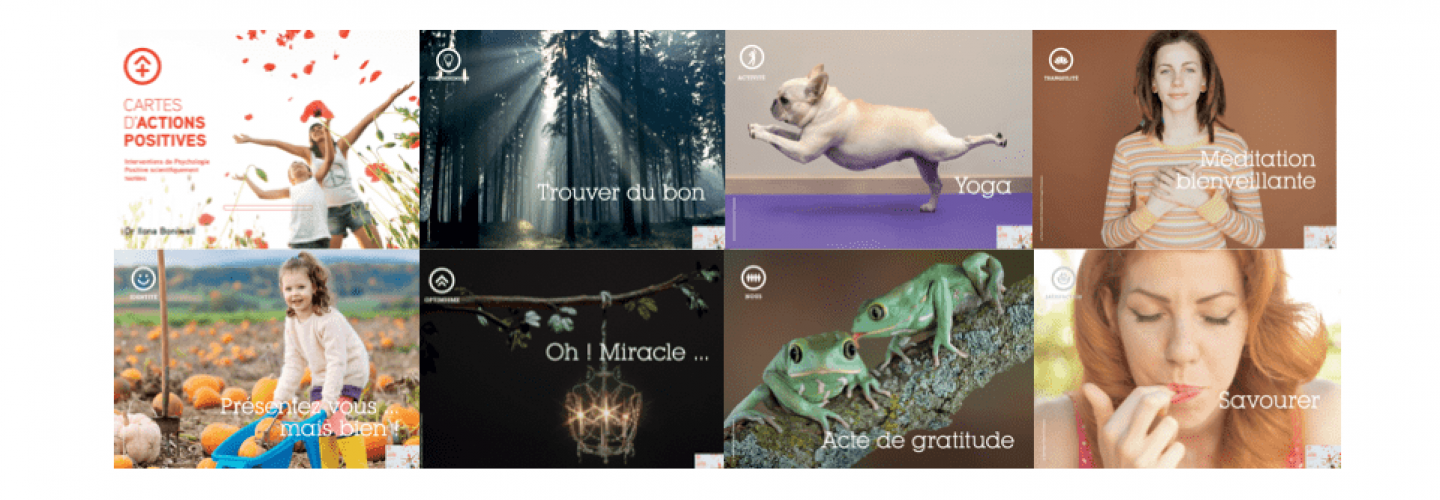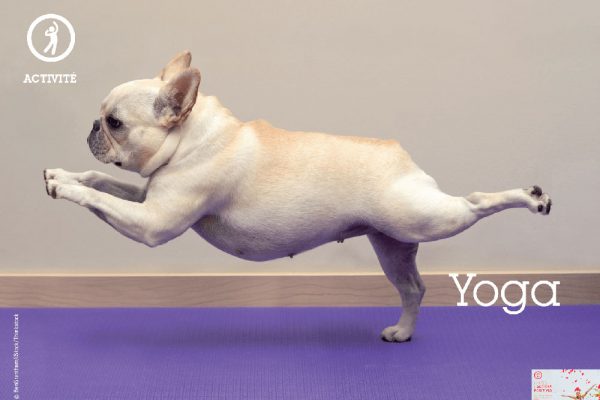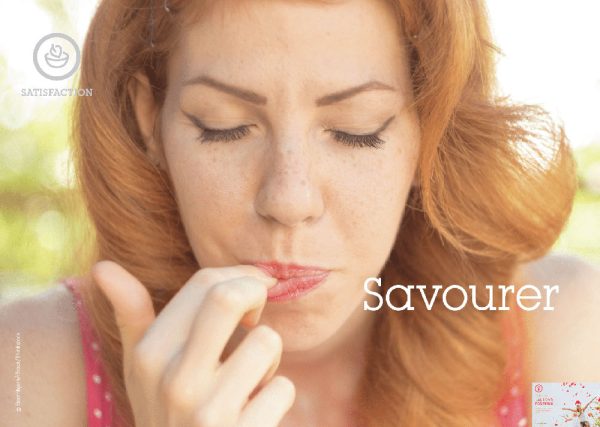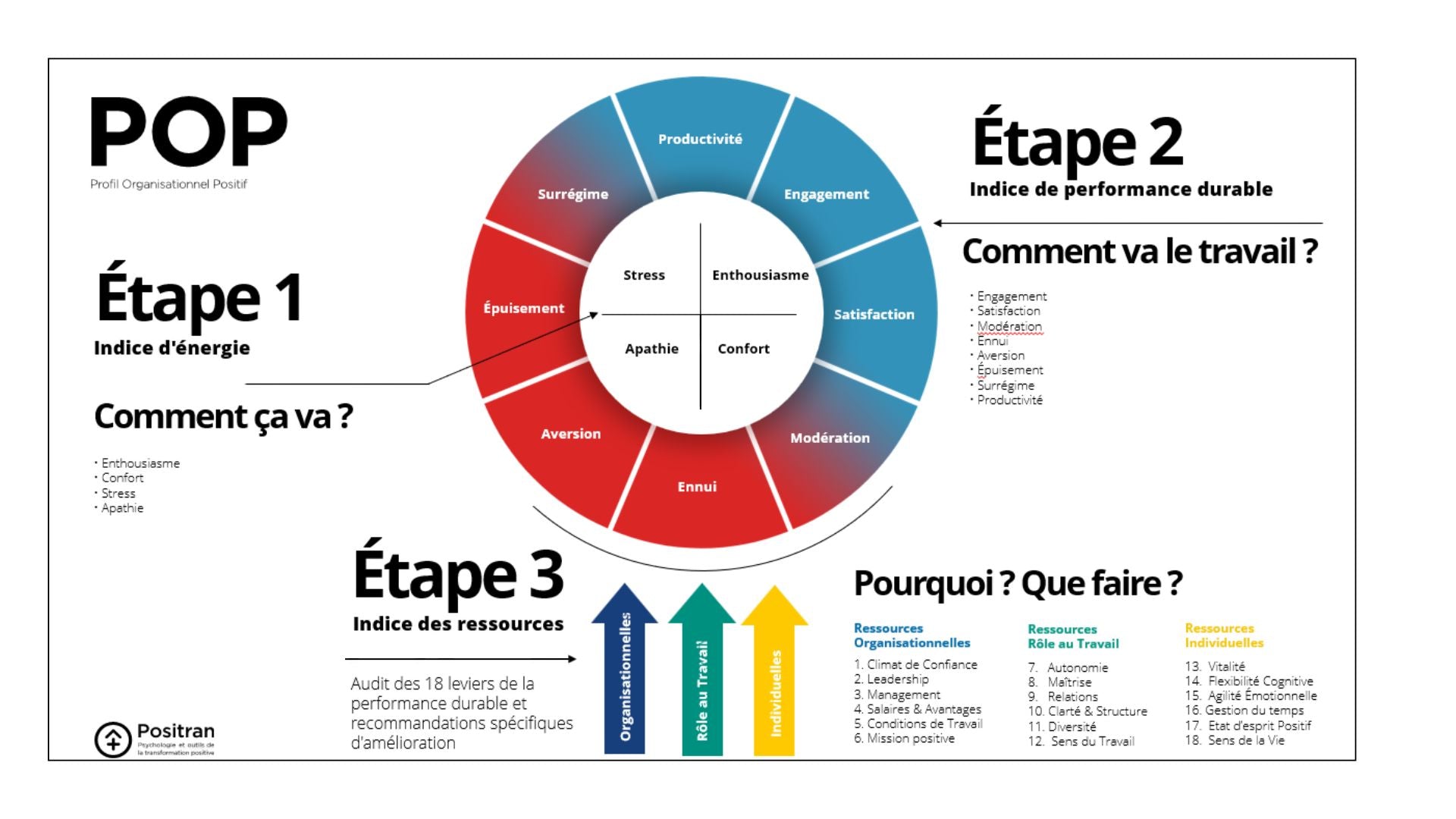7 actions to strengthen your resilience on a daily basis
Strengthening your resilience on a daily basis or what can you put in place to better cope psychologically with this confinement?
Positive interventions are actions that have shown beneficial scientific results when implemented in groups.
Positran has grouped them into a game of 64 positive action cards . In this article, we offer you 7 actions that seem most appropriate to the situation we are currently experiencing.

7 ACTIONS TO STRENGTHEN YOUR RESILIENCE EVERY DAY
Positran has brought together in a deck of 64 cards the scientific interventions of positive psychology that improve our psychological well-being and strengthen our psychological potential. These 64 positive interventions are grouped under the acronym ACTIONS which represent types of activities to be implemented: Physical Activity, Understanding, Tranquility, Identity, Optimism, Us, Satisfaction.

1- Physical activity: move to feel good in your body and in your mind
Physical activity for 3 times 30 minutes is as effective as taking antidepressants. And practicing yoga is linked to increased gratitude and a greater sense of purpose in life (Babyak et al, 2000; Ben Shahar, 2010).
How to do it? Yoga can be practiced almost anywhere, without having to invest large sums in equipment. During the lockdown, many platforms are offering free remote classes. It's a popular activity practiced by many people. Yoga can be practiced in very simple forms, such as chair yoga, or progress to technically advanced exercises.
- Increases psychological well-being
- Reduces depression
2- Understanding: laying things out flat to calm down
In psychology, it has been proven that writing allows us to distance ourselves from negative or even traumatic emotions in order to better digest them.
Think about your current experience for a few moments. What emotions are you feeling? Then, focus on what you find positive about it. Write about the changes it brings about in you, your realizations, and how you might grow from it. Is this experience benefiting you as a person? Are you better equipped to cope with future challenges? Don't worry too much about punctuation, spelling, or grammar in this writing; simply allow yourself to write freely, as much as possible, about the positive aspects of this experience.
It is recommended to write for 20 minutes a day, for 3 consecutive days. On the 2nd and 3rd day you can write more about the same experience or write about one or more other events if you wish.
- Increases mental health
- Increases physical health
3- Tranquility: create bubbles to calm down
The benefits of mindfulness are numerous. This practice is good for oneself (better stress management and self-awareness), for our relationships with others (more empathy and connection to others), and for our performance (better decision-making, more creativity).
How to do it?
Among the meditations that have the most impact are meditations of love and compassion. We therefore suggest the following protocol: Imagine someone you love deeply. Notice the sensations around your heart. Perhaps a feeling of warmth, openness, and tenderness… Breathe and focus on these feelings, these sensations, by visualizing the loved one. Imagine that your exhalation sends and channels all these feelings towards the loved one. Imagine these feelings resting on the loved one, filling him/her with peace and happiness. At the same time, silently say these sentences: “I wish you to be happy. I wish you not to suffer. I wish you to feel joy and ease.” (3 minutes)
- Increases positive emotions, well-being, positive relationships, health
- Reduces depression and anxiety
4- Identity: know yourself better to do what motivates you
According to research, our character strengths help us feel more confident in facing challenges. We offered you the chance to identify your strengths for free. You can still do so by clicking here . We have give ideas for better coping with confinement by finding activities that match your strengths.
In this article, based on these identified strengths, we suggest you work on a positive presentation of yourself.
How to do it?
Write a positive one-page (approximately 300 words) self-introduction. Include an example that illustrates your character strengths. Now, identify your best strengths (signature strengths) from your positive introduction and tell someone how these signature strengths have served you well. This will likely take 1 week to complete.
- Increases well-being
- Reduces depression
5- Optimism: looking to the future with positivity
Optimism is a trait but also a skill that can be worked on in everyone.
How to do it? Imagine that one night, while you were sleeping, a miracle occurs in your life: a memorable magical event that solves your problem (whatever it may be) and perhaps even, by propagation, significantly improves other aspects of your life. However, since you were asleep, you do not know that the miracle has occurred.
When you woke up the next morning, what would be different? What would indicate to you that the miracle had occurred? Describe this in detail. What is the first thing you would notice when you woke up? Have you experienced this before? What would it take to create such a miracle? What would it be like?
- Increases positive emotions
- Increases vision
- Increases well-being
- Increases psychological capital
6- Us: strengthen these bonds to feel stronger
In positive psychology, one of the strongest feelings is gratitude. This emotion is felt when we give thanks for the things we have and the people around us. It is beneficial when it is felt and even more so when it is shared with the people who are the source of this gratitude. We suggest you train your gratitude.
How to do it?
In life, there are a multitude of things—big and small—for which we can feel grateful. Think of someone you are grateful to for something they have done. Write them a letter describing what they did and what impact it had on your life. Once the letter is written, call the person and arrange to meet, preferably at their home. During this meeting, read your letter aloud to the person.
- Increases well-being and positive emotions
- Reduces depression
7- Satisfaction: create delicious little moments to savor
Savoring is paying attention to, appreciating, and enhancing the positive experiences in our lives through thoughts and actions that increase the intensity, duration, and appreciation of our positive experiences and emotions. It's not just the feeling of positive emotions, but a deliberate effort to make that positive experience last. Try it!
How to do it?
Recall three positive events from the past week and make a list of things you could have done to savor those moments and benefit from them longer. For 15 days, focus at least 2 to 3 minutes a day on three positive experiences and try to make the pleasure last as long as possible.
This intervention is effective if implemented for 1 or 2 weeks. You can use any of the following strategies to savor: sharing with others, holding a colorful image in your mind to recall the scene later, increasing pleasure by focusing on certain stimuli, fully immersing yourself in the moment, experiencing wonder, expressing your well-being nonverbally, congratulating yourself, hoping the moment lasts forever, or appreciating your good fortune.
- Increases positive emotions
- Increases depression
7 ACTIONS TO STRENGTHEN YOUR RESILIENCE EVERY DAY
Many caregivers use the different Positive Action Cards to help individuals identify activities to do to strengthen their daily psychological well-being, feel more positive emotions, strengthen their bonds, develop self-confidence, etc.
With this article, we wanted to give you an overview of the possible activities for each of the 7 categories of ACTIONS: Physical Activity, Understanding, Tranquility, Identity, Optimism, Us, Satisfaction.
These 7 actions seem appropriate to us to test during this period of confinement that we are experiencing.
Research has shown that these actions yield greater results when they are chosen directly by the beneficiaries themselves. So only undertake activities that speak to you and that you would spontaneously go for. You can also look among the 64 other positive actions to see which ones appeal to you the most. Positive Action Cards (Delivery is safe and free during confinement with the code “stay at home” ).
Bonus to strengthen your resilience
The stressful times we're experiencing may be disrupting your sleep. We offer a military-backed protocol to help you regain 1.5 hours of sleep in just a few minutes.











Leave a comment
All comments are moderated before being published.
This site is protected by hCaptcha and the hCaptcha Privacy Policy and Terms of Service apply.